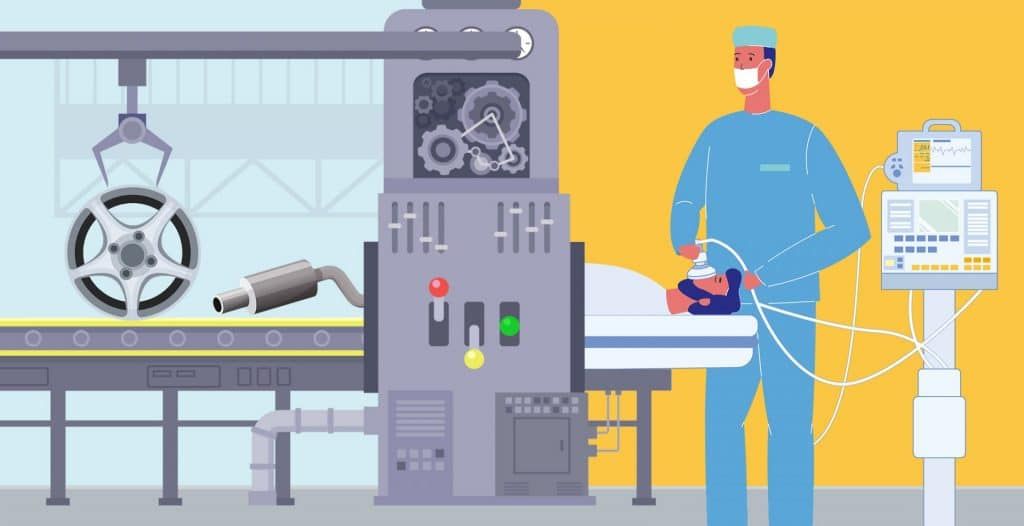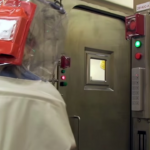Ventilators for coronavirus patients: Why automakers aren’t the right source
By Ivan Oelrich | March 29, 2020
 Illustration by Thomas Gaulkin / Vectorstock
Illustration by Thomas Gaulkin / Vectorstock
The United States faces a dangerous shortage of ventilators, the essential devices that assist the breathing of critically ill COVID-19 patients. New York governor Andrew Cuomo has called for at least 30,000 additional ventilators in his state alone, and many tens of thousands more may be needed than are now available nationwide. But companies that currently make ventilators will not be able to ramp up production quickly enough to meet the demands of the exponentially growing cases of COVID-19.
On Friday, Donald Trump demanded via tweet that US automobile manufacturers come to the rescue and excoriated General Motors executives for saying “they were going to give us 40,000 much needed Ventilators, ‘very quickly’. Now they are saying it will only be 6,000, in late April.” Hours later, Trump invoked the Defense Production Act to compel ventilator production by General Motors and appointed his trade adviser Peter Navarro to coordinate federal policy under the act.
As usual with “this” General Motors, things just never seem to work out. They said they were going to give us 40,000 much needed Ventilators, “very quickly”. Now they are saying it will only be 6000, in late April, and they want top dollar. Always a mess with Mary B. Invoke “P”.
— Donald J. Trump (@realDonaldTrump) March 27, 2020
Why General Motors and Ford? Perhaps because carmakers in World War II were able to shift to mass production of warplanes and tanks in numbers that swamped our enemies. Trump has said he is now a wartime president, so that history has appeal. But the expectation is misplaced. The analogy has serious limits that could misguide policy. There are four problems here.
Assembly. For ventilator production, assembly—the strong suit of car manufacturers—is probably not the choke point; rather, it is the supply of component parts. Ventilators might resemble the pumps and air conditioners used in automobiles, but few automakers build their own—they buy them from specialized producers. The government can task Ford or GM or Tesla to build ventilators, and the automakers may have spare assembly capacity. But if the suppliers who would make the relevant parts lack the capacity to meet increased demand, or are located overseas and subject to export controls, or have workers who have been ordered home by their governments, then progress will await the creation of a new supply chain—which could take months. Focus should be on parts suppliers at least as much as on assembly.
Culture. Every area of manufacture has its own culture. Companies that make furniture simply think differently than companies that make communications satellites. Manufacturers of medical devices must be constantly aware of liability lawsuits, which forces an intense focus on precision manufacture and, especially, reliability. Someone outside of that culture could provide a useful sanity check in these extraordinary times, pointing out that having at hand 100 ventilators that are 99 percent reliable and which, admittedly, might let one patient die, is better than no ventilators, which causes all of those hundred patients to die. We may need to expedite production in a way that would normally be totally unacceptable. The car companies might be able to bring this sort of pragmatic thinking to production, but so could many other types of manufacturers. Air conditioners have far more in common with ventilators than cars do. They need to pump and compress gases, control flows and pressure, carefully measure conditions and respond with automatic feedback on the whole process. We should be looking for alternative emergency sources of ventilators without fixating on the auto companies. And state governors will need to waive malpractice and liability claims against whoever is chosen to build the equipment.
Mass production. Much of what has appeared in the press about emergency manufacturing of ventilators does not reflect how mass production actually works. For example, 3D printing, sometimes mentioned in media reports, could, sure enough, get one ventilator built tomorrow but would have no hope of getting several tens of thousands built in a month or two. There will be a delicate tradeoff between getting a few machines very soon and getting a meaningful number of machines in months. We will have to accept the time needed to set up molding operations that can, once they are working, pop out a plastic part every couple of seconds.
Time. The time pressures of this emergency are very different from those of the past—and even of World War II. A US industrial base emerging from a depression, with massive unused capacity just waiting for employment, nevertheless needed over a year to repurpose itself from automobiles and washing machines to tanks and airplanes. This did not happen in three weeks. The World War II analogy often offered as a model actually suggests a warning for today, and should not blind us to the complexity of repurposing modern industrial production quickly. We need to choose the manufacturers carefully to avoid supply chain bottlenecks in a globalized production system. We need to navigate cultural divides across industries that could lead to unanticipated design or regulatory minefields. We need to plan ahead for the ten thousandth unit of output and not just the first. And we need to recognize that repurposing a manufacturer cannot be done overnight—even if we do everything else right. Facile images of Ford assembly lines building World War II bombers can only get us so far in solving the ventilator problems of today.
It is important to start off on the right path. We can afford to waste some money. But we cannot afford to seek one champion, fail, regroup, and then come up with a Plan B. We simply do not have time. The government and industry must think carefully about whom we are going to ask to take up this task. There are options better than carmakers.
Together, we make the world safer.
The Bulletin elevates expert voices above the noise. But as an independent nonprofit organization, our operations depend on the support of readers like you. Help us continue to deliver quality journalism that holds leaders accountable. Your support of our work at any level is important. In return, we promise our coverage will be understandable, influential, vigilant, solution-oriented, and fair-minded. Together we can make a difference.
Keywords: Coronavirus, Defense Production Act, General Motors, ventilators
Topics: Biosecurity, Opinion















Auto makers are in key states for winning the presidency. I’m surprised Trump didn’t convert Wisconsin dairies for ventilators.
The government doesn’t know anything about manufacturing. They don’t even know how little they know. In fact, neither do they know anything about which they do know. I arrive here: The government doesn’t know anything. The government raided the budgets of its emergency response capabilities. Now that a pandemic is here, oops, they are caught flat footed. The ventilators are needed in April. July will be too late. The government should have directed the production to shops that can do it. Short of that, the government should have at least sounded the alarm and called for emergency expansion of existing… Read more »